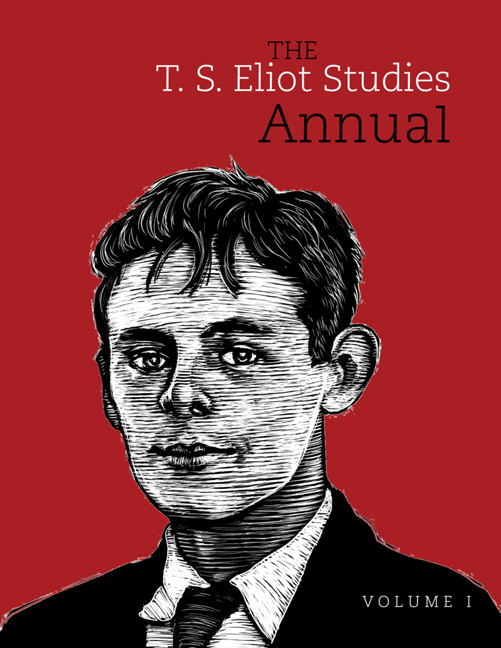Book contents
- Frontmatter
- Contents
- Abbreviations of Works
- General Editor's Note
- The Short and Surprisingly Private Life of King Bolo: Eliot's Bawdy Poems and Their Audiences
- Dull Tom-Tom's Absurd Prelude: Ludic Modernism in Early T. S. Eliot
- Eliot at Bergson's Lectures, 1910–1911
- The American Legacy of “Prufrock”
- Poetry (June 1915)
- The Stale Dregs of Revolt
- Prufrock, Belated
- Eliot's Allusive Legacy and Obscurity in “Prufrock”
- Transmuting F. H. Bradley: T. S. Eliot's Notes Towards a Theory of Poetry
- T. S. Eliot, Phenomenologist
- Astride the Dark Horse: T. S. Eliot and the Lloyds Bank Intelligence Department
- Aristophanic Structures in Sweeney Agonistes, “The Hollow Men,” and Murder in the Cathedral
- Eliot and Virgil in Love and War
- T. S. Eliot Bibliography 2014
- Notes on Contributors
Eliot at Bergson's Lectures, 1910–1911
- Frontmatter
- Contents
- Abbreviations of Works
- General Editor's Note
- The Short and Surprisingly Private Life of King Bolo: Eliot's Bawdy Poems and Their Audiences
- Dull Tom-Tom's Absurd Prelude: Ludic Modernism in Early T. S. Eliot
- Eliot at Bergson's Lectures, 1910–1911
- The American Legacy of “Prufrock”
- Poetry (June 1915)
- The Stale Dregs of Revolt
- Prufrock, Belated
- Eliot's Allusive Legacy and Obscurity in “Prufrock”
- Transmuting F. H. Bradley: T. S. Eliot's Notes Towards a Theory of Poetry
- T. S. Eliot, Phenomenologist
- Astride the Dark Horse: T. S. Eliot and the Lloyds Bank Intelligence Department
- Aristophanic Structures in Sweeney Agonistes, “The Hollow Men,” and Murder in the Cathedral
- Eliot and Virgil in Love and War
- T. S. Eliot Bibliography 2014
- Notes on Contributors
Summary
In the Eliot Collection of Harvard's Houghton Library is a small notebook containing surviving notes for Henri Bergson's lectures at the College de France, which Eliot attended during his 1910–1911 sojourn in Paris. On the cover of the light green notebook imprinted with the word “Odéon” and a photo of the famous theater surrounded by curling ribbon and the mask of tragedy, Eliot wrote in black ink in capital letters in the top left corner “BERGSON” and “VENDREDI” (FRIDAY), the day on which Bergson taught his course on personality. Inside are detailed notes, in Eliot's tall, elongated Paris handwriting largely in French. The first three and a half pages are undated and are clearly the last part of a previous lecture which would have taken place on December 23, 1910, the last class before the three-week Christmas holiday, when the topics were psychology in the nineteenth century and then the philosopher David Hume, with long quotes from Hume in French on page two and some quotes in English on the following page. This portion of the notes suggests that a previous notebook, which has not survived, contained his notes for the first three class meetings on December 9, 16, and 23, 1910, in the last of which he took notes for the first part of the lecture and then continued in a new notebook, the one preserved in the Houghton. His notes for Friday, January 13, 1911, the first class meeting after the holidays, begin on page 4, followed by notes for five successive Fridays (January 20 and 27, February 3, 10, and 17, beside the last of which he mistakenly writes “Mercredi” (Wednesday). So the notes cover half of a previous lecture (presumably on December 23) and six class meetings in January and February 1911.
These undated opening three and a half pages testify to the very legitimate probability that Eliot began attending on the first day of the lectures, December 9, 1910; indeed, as I suggested in T. S. Eliot's Parisian Year, Eliot may well have proposed attending Bergson's riveting lectures to his parents as the major reason for his Parisian stay with the argument that it would bolster his future profession as a professor of philosophy.
- Type
- Chapter
- Information
- The T. S. Eliot Studies Annual , pp. 57 - 66Publisher: Liverpool University PressPrint publication year: 2017



